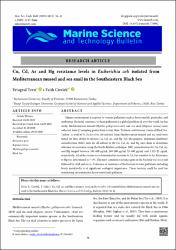Cu, Cd, As and Hg resistance levels in Escherichia coli isolated from Mediterranean mussel and sea snail in the Southeastern Black Sea
Künye
Terzi, E., & Civelek, F. (2021). Cu, Cd, As and Hg resistance levels in Escherichia coli isolated from Mediterranean mussel and sea snail in the Southeastern Black Sea. Marine Science and Technology Bulletin, 10(1), 36-41. https://doi.org/10.33714/masteb.776902Özet
Marine environment is exposed to various pollutants such as heavy metals, pesticides, and antibiotics. Bacterial resistance to these pollutants is a global problem all over the world. In this study, Mediterranean mussel (Mytilus galloprovincialis) and sea snail (Rapana venosa) were collected from 12 sampling points from Artvin, Rize, Trabzon, and Giresun Coasts of Black Sea, Turkey. A total of 54 Escherichia coli isolated from Mediterranean mussel and sea snail were tested for their ability to tolerate Cu, Cd, As, and Hg. For this purpose, minimum inhibitory concentration (MIC) tests for all isolates to the Cu, Cd, As, and Hg were done to determine tolerance or resistance using the broth dilution technique. MIC concentration for Cu, Cd, As, and Hg ranged between 100-400 μg/ml, 100-200 μg/ml, 25-400 μg/ml, and 3.125-25 μg/ml, respectively. All of the strains were determined as resistant to Cu, but sensitive to As. Resistance to Hg was determined as 7.4 %. The most common resistance gene in the bacteria was nccA and followed by chrB and merA. Tolerance or resistance of the bacteria to toxic pollutants including heavy metal(oid)s is of significant ecological importance. These bacteria could be used for monitoring environmental heavy metal(oid) pollution.


















